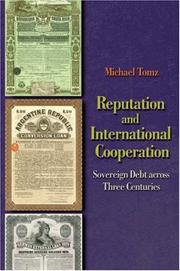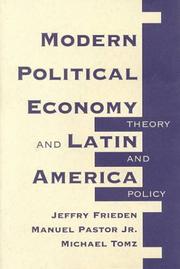| Listing 1 - 7 of 7 |
Sort by
|

ISBN: 1283379945 9786613379948 1400842921 9781400842926 0691134693 0691129304 9781283379946 Year: 2012 Publisher: Princeton, NJ
Abstract | Keywords | Export | Availability | Bookmark
 Loading...
Loading...Choose an application
- Reference Manager
- EndNote
- RefWorks (Direct export to RefWorks)
How does cooperation emerge in a condition of international anarchy? Michael Tomz sheds new light on this fundamental question through a study of international debt across three centuries. Tomz develops a reputational theory of cooperation between sovereign governments and foreign investors. He explains how governments acquire reputations in the eyes of investors, and argues that concerns about reputation sustain international lending and repayment. Tomz's theory generates novel predictions about the dynamics of cooperation: how investors treat first-time borrowers, how access to credit evolves as debtors become more seasoned, and how countries ascend and descend the reputational ladder by acting contrary to investors' expectations. Tomz systematically tests his theory and the leading alternatives across three centuries of financial history. His remarkable data, gathered from archives in nine countries, cover all sovereign borrowers. He deftly combines statistical methods, case studies, and content analysis to scrutinize theories from as many angles as possible. Tomz finds strong support for his reputational theory while challenging prevailing views about sovereign debt. His pathbreaking study shows that, across the centuries, reputations have guided lending and repayment in consistent ways. Moreover, Tomz uncovers surprisingly little evidence of punitive enforcement strategies. Creditors have not compelled borrowers to repay by threatening military retaliation, imposing trade sanctions, or colluding to deprive defaulters of future loans. He concludes by highlighting the implications of his reputational logic for areas beyond sovereign debt, further advancing our understanding of the puzzle of cooperation under anarchy.
Debts, External --- Debtor and creditor --- Creditor --- Commercial law --- Contracts --- Obligations (Law) --- Credit --- Creditors' bills --- Fraudulent conveyances --- Liens --- Payment --- Security (Law) --- Debts, Foreign --- Debts, International --- External debts --- Foreign debts --- International debts --- Debt --- International finance --- Investments, Foreign --- History. --- Law and legislation --- History --- E-books

ISBN: 9780691134697 9780691129303 0691129304 0691134693 1283379945 1400842921 9786613379948 9781283379946 9781400842926 Year: 2007 Publisher: Princeton : Princeton University Press,
Abstract | Keywords | Export | Availability | Bookmark
 Loading...
Loading...Choose an application
- Reference Manager
- EndNote
- RefWorks (Direct export to RefWorks)
How does cooperation emerge in a condition of international anarchy? Michael Tomz sheds new light on this fundamental question through a study of international debt across three centuries. Tomz develops a reputational theory of cooperation between sovereign governments and foreign investors. He explains how governments acquire reputations in the eyes of investors, and argues that concerns about reputation sustain international lending and repayment. Tomz's theory generates novel predictions about the dynamics of cooperation: how investors treat first-time borrowers, how access to credit evolves as debtors become more seasoned, and how countries ascend and descend the reputational ladder by acting contrary to investors' expectations. Tomz systematically tests his theory and the leading alternatives across three centuries of financial history. His remarkable data, gathered from archives in nine countries, cover all sovereign borrowers. He deftly combines statistical methods, case studies, and content analysis to scrutinize theories from as many angles as possible. Tomz finds strong support for his reputational theory while challenging prevailing views about sovereign debt. His pathbreaking study shows that, across the centuries, reputations have guided lending and repayment in consistent ways. Moreover, Tomz uncovers surprisingly little evidence of punitive enforcement strategies. Creditors have not compelled borrowers to repay by threatening military retaliation, imposing trade sanctions, or colluding to deprive defaulters of future loans. He concludes by highlighting the implications of his reputational logic for areas beyond sovereign debt, further advancing our understanding of the puzzle of cooperation under anarchy.
Debts, External --- Debtor and creditor --- Dettes extérieures --- Débiteur et créancier --- 336.343509 --- 331.161.0 --- 336.32 --- 339.115 --- AA / International- internationaal --- Debts, Foreign --- Debts, International --- External debts --- Foreign debts --- International debts --- Debt --- International finance --- Investments, Foreign --- Creditor --- Commercial law --- Contracts --- Obligations (Law) --- Credit --- Creditors' bills --- Fraudulent conveyances --- Liens --- Payment --- Security (Law) --- History --- Geschiedenis van de overheidsfinanciën: agemeenheden --- Beheer van de rijksschuld. Road shows --- Buitenlandse schuld. Debt Equity Swap in LDC --- Law and legislation --- History.
Book
Year: 2013 Publisher: Cambridge, Mass. National Bureau of Economic Research
Abstract | Keywords | Export | Availability | Bookmark
 Loading...
Loading...Choose an application
- Reference Manager
- EndNote
- RefWorks (Direct export to RefWorks)

ISBN: 9781400842926 9780691134697 Year: 2012 Publisher: Princeton, N.J. Princeton University Press
Abstract | Keywords | Export | Availability | Bookmark
 Loading...
Loading...Choose an application
- Reference Manager
- EndNote
- RefWorks (Direct export to RefWorks)

ISBN: 0429978529 0367316889 0429967446 0429498896 1429490942 9781429490948 0813324173 9780813324173 0813324181 9780813324180 Year: 2018 Publisher: Boulder : Routledge,
Abstract | Keywords | Export | Availability | Bookmark
 Loading...
Loading...Choose an application
- Reference Manager
- EndNote
- RefWorks (Direct export to RefWorks)
This is a reader that applies the newest debates in political economy to the analysis of Latin America in a way that is thematically and theoretically cohesive. Modern Political Economy and Latin America consists of carefully selected, edited readings in Latin American political economy. The editors, Jeffry Frieden and Manuel Pastor, Jr., include an introductory chapter, and a concluding article as well as brief introductions to all sections. These inclusions will make explicit the theoretical underpinnings of each article, and will highlight their respective contributions to the ongoing debates in Latin America. } Modern Political Economy and Latin America consists of carefully selected, edited readings in Latin American political economy. The editors, Jeffry Frieden and Manuel Pastor, Jr., include an introductory chapter, and a concluding article as well as brief introductions to all sections. These inclusions will make explicit the theoretical underpinnings of each article, and will highlight their respective contributions to the ongoing debates in Latin America.Latin American economies are undergoing profound transformations. And, in the wake of a decade-long debt crisis, the statist models of the past are giving way to a reliance on the market even as authoritarian rule seems to have ebbed in favor of new or reborn democratic institutions. As a result, the policy framework guiding economic and political development is likely to be fundamentally different. The analysis of Latin America needs a strong dose of modern political economy--one that can bring the area studies field up to date with the recent developments on the theoretical end of the economics and political science professions. This book helps fill that need. }
Cakchikel Indians --- Cakchikel philosophy. --- Earthquakes. --- Economic history. --- Economic policy. --- Political violence. --- Politics and government. --- Social conditions. --- Wirtschaft. --- Social life and customs. --- Latin America --- Economic conditions. --- Social history.
Digital
Year: 2013 Publisher: Cambridge, Mass. National Bureau of Economic Research
Abstract | Keywords | Export | Availability | Bookmark
 Loading...
Loading...Choose an application
- Reference Manager
- EndNote
- RefWorks (Direct export to RefWorks)
In this essay we review the empirical literature about sovereign debt and default. As we survey the work of economists, historians, and political scientists, we also emphasize parallel developments by theorists and recommend steps to improve the correspondence between theory and data.
Book
Year: 2013 Publisher: Cambridge, Mass. National Bureau of Economic Research
Abstract | Keywords | Export | Availability | Bookmark
 Loading...
Loading...Choose an application
- Reference Manager
- EndNote
- RefWorks (Direct export to RefWorks)
In this essay we review the empirical literature about sovereign debt and default. As we survey the work of economists, historians, and political scientists, we also emphasize parallel developments by theorists and recommend steps to improve the correspondence between theory and data.
| Listing 1 - 7 of 7 |
Sort by
|

 Search
Search Feedback
Feedback About UniCat
About UniCat  Help
Help News
News